ABUJA, NIGERIA —
Most rural residents of the Niger Delta barely have enough money to stay alive, and the economy of the countryside is changing for the worse, with fishing and farming becoming less profitable. Residents say that if their dilapidated schools do not get more teachers and supplies, the next generation of Niger Deltans will have it even worse.
This school in Abuja was built in the 1970s as part of a program to bring education to the countryside in the Niger Delta, where families often are isolated by a lack of roads and infrastructure. Acting Principal Michael Okorafor said back then it was funded, but now it is falling apart.
“We don’t have adequate staff. We don’t have English masters, even math masters we are lacking. Core subjects,” he said.
Dilapidated schoolhouses
Okorafor said some buildings are in disrepair, while others are entirely unusable. Dried skins of poisonous snakes are scattered on the concrete floors of the administration building and the teachers will not go inside.
Odike Ambrose, another rural primary school headmaster, said even worse is that teachers do not want jobs in remote areas, and those that accept the posts often do not show up.
“Most of the teachers refuse to accept postings to the rural areas. It’s a true story,” said Ambrose.
He said any family that can afford it sends their children to the city to go to school. But most families cannot.
Poisonous oil spills
Samson Okoro is an education consultant and retired secondary school teacher in Warri, a city rich in oil and little else. He said most rural children in the Niger Delta do not go to college and have the same job choices as their parents: fishing and farming.
Decades of massive oil spills have made these two jobs less profitable, however, and families increasingly are desperate to find some other way to make money.
“For any economy to succeed they must improve on education. For any economy to improve, you must educate your people,” said Okoro.
He added that failed schools in the countryside also threaten the stability of the Niger Delta.
Residents already are angry that the government and oil companies reap huge profits while most of the roughly 31 million residents live on less than $1 a day. In the last few years, tens of thousands of militants laid down their weapons, ending decades of battle. The peace remains fragile, though, with attacks on oil pipelines still a regular occurrence.
With oil spills making the people poorer and no chance to get out through education, Okoro said the residents of the Niger Delta are likely to get even more angry.
Hilary Uguru contributed to this report from the Niger Delta.
This school in Abuja was built in the 1970s as part of a program to bring education to the countryside in the Niger Delta, where families often are isolated by a lack of roads and infrastructure. Acting Principal Michael Okorafor said back then it was funded, but now it is falling apart.
“We don’t have adequate staff. We don’t have English masters, even math masters we are lacking. Core subjects,” he said.
Dilapidated schoolhouses
Okorafor said some buildings are in disrepair, while others are entirely unusable. Dried skins of poisonous snakes are scattered on the concrete floors of the administration building and the teachers will not go inside.
Odike Ambrose, another rural primary school headmaster, said even worse is that teachers do not want jobs in remote areas, and those that accept the posts often do not show up.
“Most of the teachers refuse to accept postings to the rural areas. It’s a true story,” said Ambrose.
He said any family that can afford it sends their children to the city to go to school. But most families cannot.
Poisonous oil spills
Samson Okoro is an education consultant and retired secondary school teacher in Warri, a city rich in oil and little else. He said most rural children in the Niger Delta do not go to college and have the same job choices as their parents: fishing and farming.
Decades of massive oil spills have made these two jobs less profitable, however, and families increasingly are desperate to find some other way to make money.
“For any economy to succeed they must improve on education. For any economy to improve, you must educate your people,” said Okoro.
He added that failed schools in the countryside also threaten the stability of the Niger Delta.
Residents already are angry that the government and oil companies reap huge profits while most of the roughly 31 million residents live on less than $1 a day. In the last few years, tens of thousands of militants laid down their weapons, ending decades of battle. The peace remains fragile, though, with attacks on oil pipelines still a regular occurrence.
With oil spills making the people poorer and no chance to get out through education, Okoro said the residents of the Niger Delta are likely to get even more angry.
Hilary Uguru contributed to this report from the Niger Delta.






